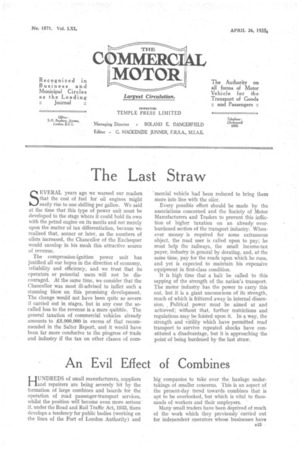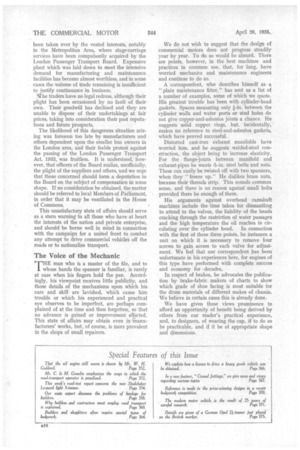An Evil Effect of Combines
Page 33

Page 34

If you've noticed an error in this article please click here to report it so we can fix it.
HUNDREDS of small manufacturers, suppliers and repairers are being severely hit by the formation of large combines and boards for the operation of road passenger-transport services, whilst the position will become even more serious" if, under the Road and Rail Traffic Act, 1933, there develops a tendency for public bodies (working on the lines of the Port of London Authority) and big companies to take over the haulage undertakings of smaller concerns. This is an aspect of the present-day trend towards combines that is apt to be overlooked, but which is vital to thousands of workers and their employers.
Many small traders have been deprived of much of the work which they previously carried out for independent operators whose businesses have been taken over by the vested interests, notably in the Metropolitan Area, where stage-carriage services have been compulsorily acquired by the London Passenger Transport Board. Expensive plant which was laid down to meet the intensive demand for manufacturing and maintenance facilities has become almost worthless, and in some cases the volume of trade remaining is insufficient to justify continuance in business.
Mlle traders have no legal redress, although their plight has been occasioned by no fault of their own. Their goodwill has declined and they are unable to dispose of their undertakings at fair prices, taking into consideration their past reputations and future prospects.
The likelihood of this dangerous situation arising was foreseen too late by manufacturers and others dependent upon the smaller bus owners in the London area, and their feeble protest against the passing of the London Passenger Transport Act, 1933, was fruitless. It is understood, however, that officers of the Board realize, unofficially, the plight of the suppliers and others, and we urge that those concerned should form a deputation to the Board on the subject of compensation in some shape. If no consideration be obtained, the matter should be referred to local Members of Parliament, in order that it may be ventilated in the House of Commons.
This unsatisfactory state of affairs should serve as a stern warning to all those who have at heart the interests of the nation and private enterprise, and should be borne well in mind in connection with the campaign for a united front to combat any attempt to drive commercial vehicles off the roads or to nationalize transport.
The Voice of the Mechanic
THE man who is a master of the file, and to whose hands the spanner is familiar, is rarely at ease when his fingers hold the pen. Accordingly, his viewpoint receives little publicity, and those details of the mechanisms upon which his care and skill are lavished, which cause him trouble or which his experienced and practical eye observes to be imperfect, are perhaps complained of at the time and then forgotten, so that no advance is gained or improvement effected. This state of affairs may obtain even in Cirianufacturers' works, but, of course, is more prevalent in the shops of small repairers. We do not wish to suggest that the design of commercial motors does not progress steadily year by year. To do so would be absurd. There are points, however, in the best machines and practices in common use, that, for long, have worried mechanics and maintenance engineers and continue to do so.
A correspondent, who describes himself as a "plain maintenance fitter," has sent us a list of a number of examples, some of which we quote. His greatest trouble has been with cylinder-head gaskets. Spaces measuring only I-in. between the cylinder walls and water ports or stud holes do not give copper-and-asbestos joints a chance. He suggests solid copper rings, but, incidentally, makes no reference to steel-and-asbestos gaskets, which have proved successful.
Distorted cast-iron exhaust manifolds have worried him, and he suggests welded-steel construction, the object being to increase elasticity. For the flange-joints between manifold and exhaust-pipes he wants k-in. steel bolts and nuts. These can easily be twisted off with two spanners, when they "freeze up." He dislikes brass nuts, because their threads strip. This sounds common sense, and there is no reason against small bolts provided there be enough of them.
His arguments against overhead camshaft machines include the time taken for dismantling to attend to the valves, the liability of the heads cracking through the restriction of water passages and the high temperature the oil reaches in circulating over the cylinder head. In connection with the first of these three points, he instances a unit on which it is necessary to remove four screws to gain access to each valve for adjustment. We feel that our correspondent has been unfortunate in his experiences here, for engines of this type have performed with complete success and economy for decades, In respect of brakes, he advocates the publication by brake-fabric makers of charts to show which grade of shoe facing is most suitable for the drum materials of different makes of chassis. We believe in certain cases this is already done.
We have given these views prominence to afford an opportunity of benefit being derived by others from our reader's practical experience, and, to designers, of wearing the cap, if to do so be practicable, and if it be of appropriate shape and dimensions.,




































































































